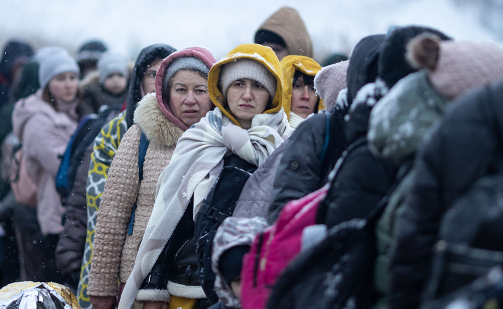Human Rights
Ireland to Slash Weekly Allowance for Ukrainian Refugees

Ireland has announced a significant reduction in the weekly allowance for Ukrainian refugees living in state-provided accommodation, aiming to align its system more closely with other European countries.
Financial Support Cut for Thousands of Refugees
Starting in August, Ukrainian refugees in state accommodation will see their weekly allowance drop from €220 to €38.80, affecting approximately 27,000 people. This change impacts roughly one-third of all Ukrainians who sought refuge in Ireland following the Russian invasion in February 2022.
Government Justification and Responses
The Irish government justified the cuts by citing the need for alignment with other European countries’ systems. However, the Ukrainian Ambassador to Ireland expressed concern about the proposed changes, as reported by Ireland’s national broadcaster RTE.
According to Reuters, nearly half of the 100,000 Ukrainians who fled to Ireland live in state-provided accommodation, which includes hotels and guesthouses offering meals and other services. The remaining 47,000 housed in state accommodation include some of the 19,000 employed Ukrainians who do not receive welfare payments.
Criticism from Advocacy Groups
Effective Aid Ukraine, a charity supporting Ukrainian refugees, criticized the decision, highlighting that the cuts would predominantly affect elderly people and mothers unable to work due to childcare responsibilities. Tom McEnaney, founder of the group, described the measures as “draconian,” arguing that they contradict the generous spirit previously shown by the Irish government and people.
“We are going from being generous to being mean and cold-hearted,” McEnaney told RTE. “This decision is completely at odds with how the Irish people in general feel about Ukrainians who have no choice but to flee the war.”
Broader Context of Housing and Asylum Issues
Ireland, with a population of 5.3 million, has one of the highest per capita rates of Ukrainian refugees. The country has struggled for years to build more affordable housing, a challenge exacerbated by the sharp increase in asylum applications.
Of the 18,750 Ukrainians not living in state accommodation, they will continue to receive the full €220 weekly allowance. Additionally, Ireland’s Central Statistics Agency estimates that up to 23,000 Ukrainians who arrived since February 2022 may have left the country.
European Responses to Refugee Crisis
In Germany, Chancellor Olaf Scholz recently urged Ukrainian refugees to seek employment, noting that less than 20% are currently employed. Germany has taken in over 1.25 million Ukrainian refugees, the highest number in the EU, but has one of the lowest employment rates among OECD countries for these refugees.
Meanwhile, the German government is considering incentives for Ukrainians to return to their home country voluntarily, amidst a labor shortage caused by the ongoing conflict. Svenja Schulze, Germany’s Development Minister, mentioned exploring “circular migration” models to support temporary returns.
Temporary Protection Directive
The European Union activated the Temporary Protection Directive (TPD) shortly after Russia’s invasion, providing immediate but time-bound assistance to displaced people. The TPD, extended until March 2024, grants Ukrainians access to healthcare, welfare, housing, and employment, offering them almost the same rights as local nationals. However, third-country nationals who fled Ukraine have not received the same privileges.
The reduction in financial support for Ukrainian refugees in Ireland marks a significant shift in the country’s approach to the refugee crisis, raising concerns among advocates and potentially impacting thousands of vulnerable individuals.
